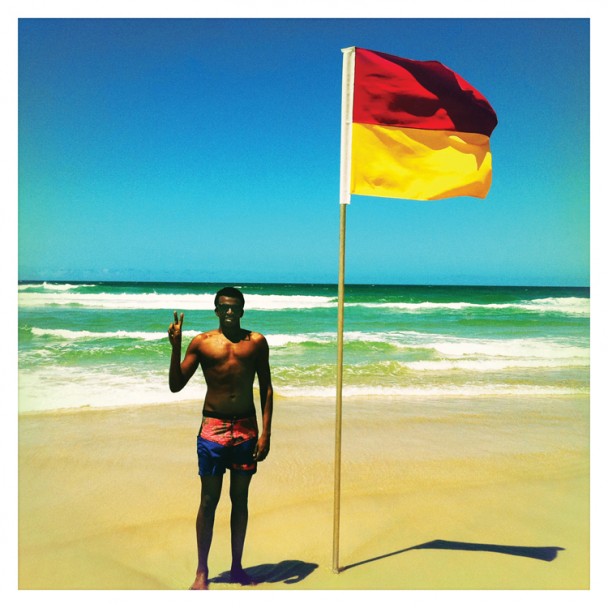Before delving into Mars, the debut release from Sinkane, you will possibly have already heard a number of facts about the artist. Sinkane is the stage name of Ahmad Gallab, a Sudanese-born musician based in New York; he has toured with the likes of Yeasayer and Caribou, and is now signed to dance-friendly label DFA. All of these give you a fairly good idea of what Mars sounds like, but the final piece of the puzzle comes from the album’s cover art; on a golden-sanded beach, backed by crystal blue water, Gallab stands casually in nothing but shorts and sunglasses, nonchalantly smiling and giving the ‘peace sign’ to the camera. This vivid image captures the colourful and tropical side of the album’s sound while simultaneously leaving the impression that this album is a fun and relaxed trip.
This feeling is seized in the opening minutes of the album with “Runnin’,” in which synths and twanging guitars work their way around a simple tropical drum beat and a basic but funky bass line, combining to create the kind of track that could easily be used to back footage of glorious islands and lush, far-off destinations. The beat stays consistent throughout the track, allowing for the other elements to ebb and flow easily around them, while Gallab’s delicate falsetto floats above. This method stays more or less consistent throughout; a chunky, thudding and organic beat is set and remains the pulse of the songs, while instruments from all times and origins dance around it. On “Jeeper Creeper” an aquatic texture is built through warbling echoey guitars, a gentle current of synths and a vocal that swims through the layers dreamily wondering aloud about all the things on his mind. On the very next track “Lady C’mon,” Gallab uses the same elements to create relaxed funk, turned robotic by the use of a heavy vocoder effect on his voice.
While Mars could not be said to have any floor-fillers, there are certainly moments on it that seem to be irresistible to bodily control. The aforementioned “Jeeper Creeper” has no trouble in getting listeners kinetic, while the simplistic polyrhythms combined with a juicy bass line in “Making Time” bring an insatiable bounce to the proceedings. These relatively intense moments of Mars inspire within the listener a vision of a far-off beach party in an idyllic location, and the other tracks on the album only increase the feeling of escapism. “Love Sick” incorporates loosely played brass and woodwinds into its slinky rhythm and bass, relaxing the listener into a feeling of laid-back recovery from a heavy night before; the opening lines of “Warm Spell” encourage you to “see the light above / feel the madness of the waves”–something that is incredibly easy to envision when heard in this musical context; and the seven minute closer “Caparundi” is the aural equivalent of drifting away: to sleep, out to sea or even into outer space–somewhere peaceful and dreamlike. The album’s title track is the odd one out here, presenting us with a three minute sound collage that has no real structure or direction, almost like waking up on a pitch black beach in the middle of the night and stumbling around cluelessly looking for your hut, but not really getting anywhere.
Having spent enough time with Mars it starts to become a bit clearer why Gallab hit upon this name for his album. Although he’s using sounds and influences from many of the musical hubs on the Earth, from Africa to America and plenty in between, with them he has created aural scenery that is so serene and heavenly that it couldn’t possibly exist on our busy and frantic planet. This brings me to the final piece of the cover art that I didn’t mention above: a flag placed triumphantly in the ground next to Gallab; a sign that he’s completed his journey to this new land, he’s claimed it, and he’s inviting you to join–no space suit required.

